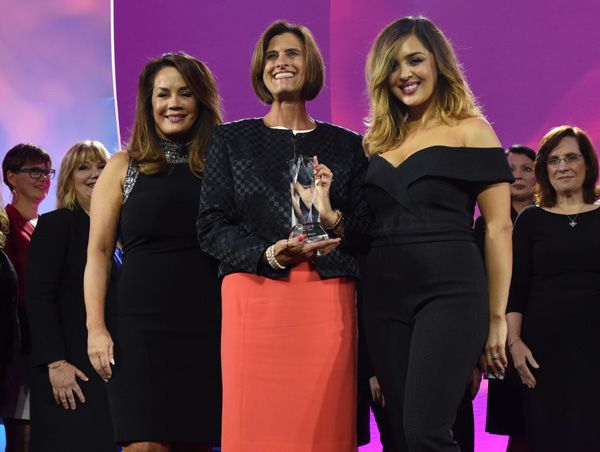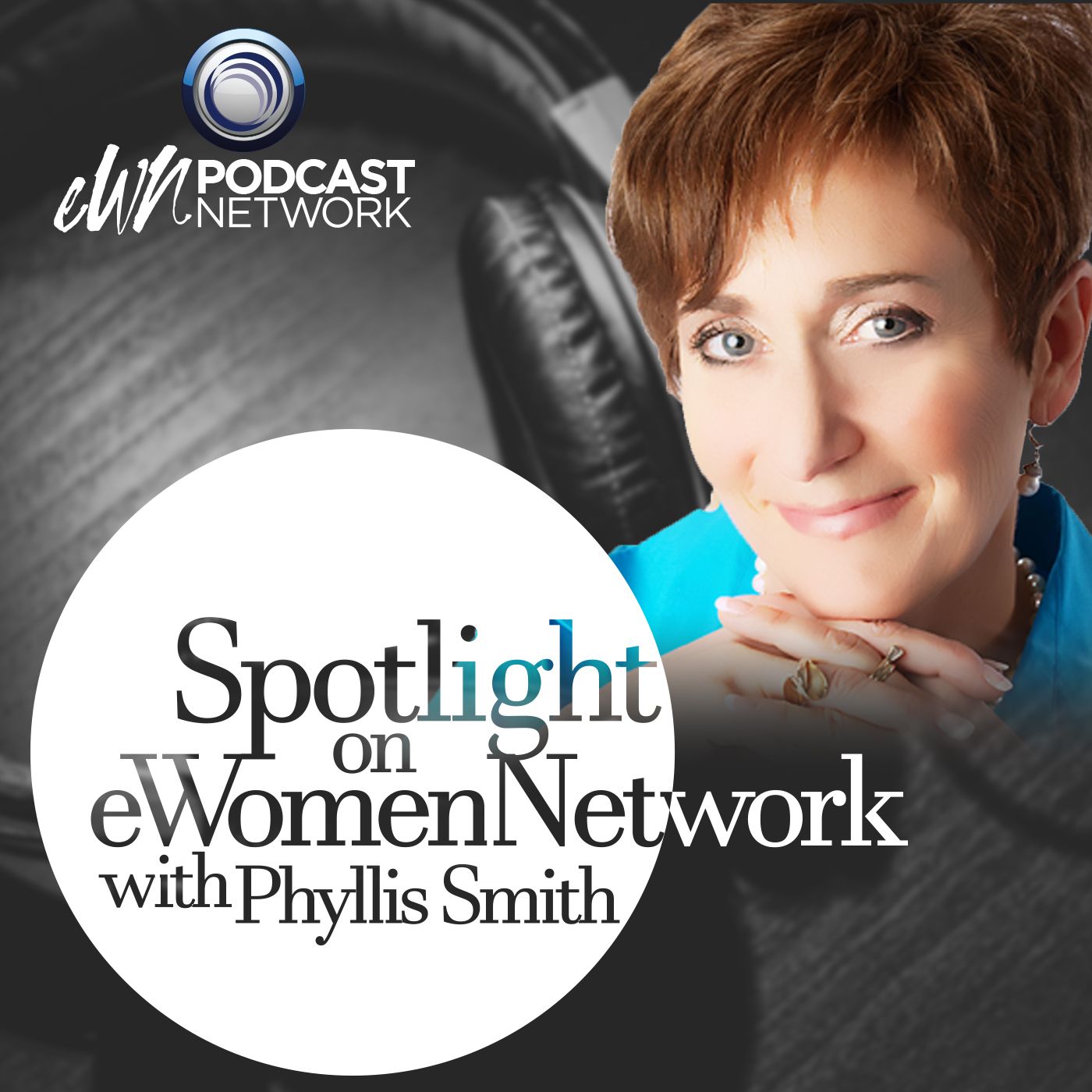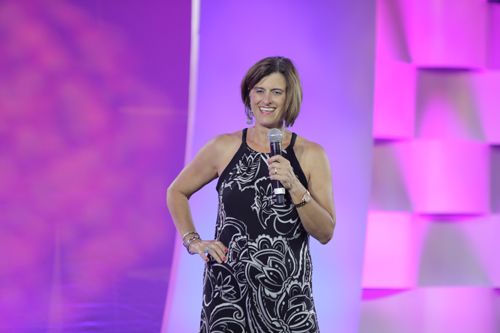eWomenNetwork 2017 Managing Director of the Year with the Colorado Springs chapter, Julie Davis, is a productivity and efficiency expert who helps entrepreneurs master patterns of business excellence. Find out the 3-D's Julie learned as a high school English teacher and nationally ranked ski racer to help you maximize productivity and monetize your business.
Watch the interview with Julie from my podcast, "eWomenNetwork Member Spotlight," or tune-in/download the audio podcast at the eWN Podcast Network.
The Challenges and Blessings of Teaching in Yuma
PHYLLIS SMITH: Your first job out of college, you were teaching in Yuma, Arizona. Isn’t there a movie about Yuma, Arizona? A western?
JULIA DAVIS: Yeah, there was a movie called Yuma 3 or something.
PHYLLIS SMITH: Right.
JULIA DAVIS: But every spaghetti western from way back when; they were always escaping from the Yuma Territorial Prison.
PHYLLIS SMITH: Oh, that’s so funny. So, that’s where you lived, that’s where you had your first teaching job and that makes sense. Your first job is always the one that is either like in the armpit of the nation or you’re making a dollar. So, you followed the correct path. What did that experience do for you in shaping you and carving out the person you are today?
JULIA DAVIS: Well, that experience was so different. I grew up in a very affluent ski town in Colorado and went to a very affluent college. I had never really experienced a poor place, and to move down to Yuma where we’re 22 miles from Mexico, we were 5 miles from the border of California, and be thrown into a school where the books were probably close to 20 years old. There were no teacher editions. Where you write your name in the textbook, it was like those lines, plus the end of the page, plus flip the page and then they were all down the back of the page. So, I got to work. I mean what do you do?
I pulled all my resources from what I had learned from my teachers in high school. I thought about what we had done and what I had learned from my education. I always say, I pulled out my Apple 2E, my Dot Matrix printer, and I got to work. I started creating what I needed. I started creating those critical thinking exercises, started putting together projects for my kids to do, essays that they could write and worked with what I had.
I pulled out my Apple 2E, my Dot Matrix printer and I got to work.
When I got back to Colorado and went into a pretty affluent district and got that teachers edition I was like – well, I could’ve written this. It was a confirmation that I had been doing things right, but really that experience for me was so much about fortitude and perseverance. I came out knowing I had what it took to be good at what I set out to do. It didn’t matter that I had nothing to work with and it didn’t matter that my kids didn’t have anything.
I was in a situation too where 60% of my kids were Hispanic and many of them crossed the border to come to school every day. Their parents were like, “You have my kids 8 hours a day. He has to come home and work in the fields or she has to come home and cook for her family, for all her siblings and they’re not going to be doing homework.” So, I had to really readjust how I thought and adjust to a new culture. I think it made me extremely adaptable to different situations depending on what it calls for.
PHYLLIS SMITH: That is so important, having flexibility knowing that we are going to be faced with challenges. Either you can give up and walk away or you can be creative, and it sounds to me that you have a creative mind. You can think through things. Even in your first teaching job you didn’t have the experience to know what to do. You figure it out along the way.
JULIA DAVIS: Yes.

Starting a Business During the Great Recession
PHYLLIS SMITH: This was not the first time that you faced a challenge like that. Also, you moved from teaching to working for a company as an independent contractor.
JULIA DAVIS: I did.
PHYLLIS SMITH: Tell us, how did that transition take place or why and what happened with that company?
JULIA DAVIS: I left teaching when I had a baby. I left, had my son, and realized about 5 months in that I’m not a stay at home mom kind of girl. I had to find something to do, but still wanted to be home with our son. I joined a multi-level marketing company and moved up through the ranks quickly to be a leader. I built a strong, strong team, had a strong sales and personal sales force on my team, and this was through the recession. I started my business in 2008 and it wasn’t easy, but I didn’t know any different. I didn’t know any better, so I did what I knew I needed to do.
I didn’t know any better, so I did what I knew I needed to do
After I had been doing that business for 6 years the company closed its doors overnight. We had business and Black Friday, Thanksgiving Day, and all of that and then December 1 it just said we’re shutting our doors.
PHYLLIS SMITH: My goodness.
JULIA DAVIS: We had no idea. If you look back you would see indications, but you really believed they were on the up and up. You believed they would’ve told us, and they didn’t.
PHYLLIS SMITH: Oh, my goodness. Can I just ask you then? Was your income important to support the family?
JULIA DAVIS: Yes, my income was. My husband had recently retired, and he had not launched his business yet. He has another business now too. He had retired from teaching and was trying to figure some things out. I was making over half our income for the family.
PHYLLIS SMITH: They shut the doors and you’re like, “Now what?” You obviously rebounded.
JULIA DAVIS: I did.
eWomenNetwork Saved me
PHYLLIS SMITH: What was the process for that rebound? I think there’s an important lesson here in terms of resilience and how important resilience is. Tell us about the rebound?
JULIA DAVIS: I need to first and foremost say I was part of eWomenNetwork then and I don’t believe I would’ve been able to do what I’ve done without it. It’s an unabashed, unapologetic. That’s what it was and that’s what eWomenNetwork means to me. So much deeper than people might realize.
For me the rebound was –
PHYLLIS SMITH: Before you go on, I do want to know, back then you were a member of eWomenNetwork. What was it that kept you going?
JULIA DAVIS: That’s a good question. When you’re in network marketing you have a community of people around you who are your teammates, who are your leaders, and who are your people. So many of the women that were on that ride with me lost that whole community, we lost everything, we all did.
The first people that reached out to me were the eWomenNetwork. I hadn’t said a word, they just heard it through the grapevine that my company had closed. The first people to reach out to me were the eWomenNetwork. “What can we do? How are you? I think you should read this book.” you know, all these things and I went. For 5 months I kept going to our meetings and I didn’t have anything to offer. I was there to hold on and figure out what I wanted to do. That was a huge part of my rebounding. It also gave me permission to explore options and because of the things that they were talking to me about, and these women were throwing my way – books that I should read, tests that I should take, and all these things. It became an exploration of what are my strengths and passions.
A Message From the Universe
PHYLLIS SMITH: Yes, and women entrepreneurs we can be very bossy.
JULIA DAVIS: We can.
PHYLLIS SMITH: But bossy in a good way.
JULIA DAVIS: Bossy in a very loving way.
I had already started feeling itchy before my company closed. I had already had these inklings, you know what I really miss – teaching. The things I love most about what I’m doing right now are the training, the leadership training, and all the stuff that I was doing at national conference to train. Those are the things that were filling me up and not the selling. I started thinking about what is truly my gifts and passions and I am at my very core an educator, a teacher.
I also knew, and this goes back a little bit to Arizona and me as a teacher, but I also knew that I am very organized. I am very good at helping others figure out their priorities, so they can make space so that they can do the things they want to do as well as the things they must do, need to do. I created a business out of it and eWomenNetwork embraced me, filled me up, and put me in front of the right people. I have an amazing business, amazing business because I have followed my passion and my heart.
eWomenNetwork embraced me, filled me up, and put me in front of the right people
PHYLLIS SMITH: I think it’s important it’s your passion, but also, we all have gifts. If you’re listening or watching and you are in that place where your company closed its doors, you’re itching to get out of your company, or you’re in a business, even your own business that just might not feel like the right fit. I think what Julie is saying is what lights your fire, what puts a smile on your face, and/or what makes you feel like its timeless? The kind of thing that you do when you don’t realize what time it is and next thing you know 3 hours have passed.
JULIA DAVIS: Right. I think to Phyllis, the other important part of that is if a block gets put in your way it’s important to find the door that the universe is opening. Like why did you get kicked in the butt or why did you get slapped in the face? It’s not a “why me” its okay “what’s next”? My husband was like, “I guess the universe just gave you a message loud and clear. You better stop talking about what you want to do and find out what you want to do.”

Skiing - Everything is Your Adversary
PHYLLIS SMITH: I love him. That’s great! That’s great! You know, the other thing that I learned about you is that, this is so cool, you were a ski racer through college. You said you grew up in Colorado and I guess everybody there ski’s.
JULIA DAVIS: Yeah.
PHYLLIS SMITH: So, let’s just face you’re going to ski if you live in Colorado, but you were a racer. Tell us about that and what that sport taught you in terms of being in business?
JULIA DAVIS: I grew up in a ski town, it was a town then, it’s bigger than a town now, Breckenridge, Colorado. I was on ski’s when I was very young and started racing when I was 9. Racing is a different sport than anything you do. You have a lot of adversaries, even though it’s an individual sport.
JULIA DAVIS: The mountain is your adversary, the course that they’ve set for you is your adversary and you’ve got to figure out a way to work with them to propel yourself as quickly as possible. Getting a little off balance can toss you completely out and you don’t finish, but you must get up and do it again tomorrow if you’re going to be successful.
The mountain is your adversary, the course that they’ve set for you is your adversary and you’ve got to figure out a way to work with them to propel yourself as quickly as possible.
What I learned from that sport was one little blip is not the end. There is a lot of races in a season and because I didn’t finish one doesn’t mean I can’t finish the other 15. In college you’re seeded and just because I didn’t get into a seed that I wanted to be in and started – at nationals one year my coach put me in a bottom seed and I was mad. I started 83rd and I finished that race in the top 20. I was 17 in the nation and in our division at end of that race.
PHYLLIS SMITH: What!?
JULIA DAVIS: Yeah.
PHYLLIS SMITH: I love this about you! I love learning this about you! It’s incredible! You really are a come from behind woman.
JULIA DAVIS: Yeah. Oh my gosh! No reason to stop. Right? Just get mad and get up and go.
PHYLLIS SMITH: Yeah. I think sports, in general, does that. I see people who were athletes, there is a mindset that athletes have, or even if you were in sports in school whatever it is. Athletes have a competitive mindset. There is a fighting through the challenge, I’m too tired to train but I’m going to anyway. I think overall that’s helpful. I really do. Even if you’re not in one those in athletics, my son was in the marching band and they must work hard and it’s exhausting. They go in at 6 in the morning and they’re there 14 hours a day on game day. It’s great, overall, getting your kids to do that early on because I think you become a fighter.
JULIA DAVIS: You do and it’s about learning to fight through what’s so hard. When you don’t think you can take one more step, you know, as an adult I’ve done other sports. It’s where you’re so tired that the tears come and you’re so exhausted and you can’t control them, but you keep going regardless. There’s something about it that and it teaches us so much about business.
PHYLLIS SMITH: It’s true. Back in the day when I skied, I was nothing like you, but I remembered in skiing, particularly the moguls. It’s really interesting when you say you have all these adversaries, I remember skiing a mogul course, and how if you tried to fight it you’d fall. You must bend your knees, you have to go with it so that you’re in the groove, and in a way, that is a metaphor for life. Right? I mean if you try to fight and resist change or the unknown what ends up happening is nothing. You resist, and you go nowhere.
JULIA DAVIS: Right or it takes you down.
PHYLLIS SMITH: Absolutely. We must take a short break and when we come back you’re going to give us some tips based on all these things that you’ve learned. What you’re talking to us now about adaptability, how you can apply that to your business, and achieve the goals that you desire and that you are worth achieving. Stay tuned.
Julie, you are a productivity expert and what helped you become a productivity expert was your experience as a teacher. Tell us how all of that happened. How did your teaching experience influence you?
JULIA DAVIS: I taught high school English, and I would say English and Math teachers do more work at home than anyone out there as far as teachers go. They work extremely hard. English teachers have a lot of essays to grade. Math teachers have a lot of Math problems to grade. What I found when I started teaching was that these teachers were working so hard and so long. They were working way into the night and then all weekend long every weekend.
I’m going to be straightforward and transparent with you Phyllis and everyone out there. I am just selfish enough that I like to do things for me that there was no way I was doing that. I was going to figure out a way that I was not doing that and not have my students suffer for it. I watched a lot of teachers work themselves into a frenzy and teachers who never gave papers back to their kids and those students would never see their work again graded. How unfair is that? They did the work, but you didn’t.
PHYLLIS SMITH: Right. How do they know if they’ve achieved their own goals?
JULIA DAVIS: Exactly!
PHYLLIS SMITH: It’s really amazing.
JULIA DAVIS: What I did was I created systems in my classroom where certain things got turned in and certain things didn’t, and I taught enough different classes that I never had stuff due at the same time. Essays from first period were never due on the same day as essays from third period so I wasn’t grading 120 essays at one time. I also figured out a way to spot check certain things to make sure they were doing the work, but the things that they needed growth in were the things I made sure they were getting my full attention on. At the same time, I did not work on the weekends. Maybe on Sunday afternoon, I would do some grading, but I really made it so that there was a flow, a system, and responsibility on my part to the students. I had to fill myself up so that I could fulfill that responsibility to.
PHYLLIS SMITH: What’s amazing about that – it’s not amazing, what it is, it’s about self-care. You must take care of yourself. They might not have been your biological children, but they were your children, and if we give and give ourselves away whether it’s our biological children or our classroom children then we have nothing left for ourselves. That doesn’t make us happy and doesn’t make us fulfilled.
What you did is find balance. This balance of being able to do the work and do a great job while helping these kids grow and get smarter which was your goal. Your goal to teach them how to read and write which is critical to your life and yet you were able to have your own life. What a brilliant thing! How then does that apply now to your clients you have in your business? How do you take that and now translate that into your coaching clients?
JULIA DAVIS: Through the years I have taken so many classes, read so many books, and trained in different areas. What I have done is taken bits and pieces of all of that plus productivity and created it for the entrepreneur. I put programs together to help them figure out how to make space for themselves in their business because entrepreneurs especially feel like – well we all feel like nobody can do it as well as we can. Many times, that’s true, but there’s also many things that don’t need to be done as well as we do them. Sandra always says, “Do those things that only you can do.” That’s what I teach them how to do.
If they get up against that roadblock where they know their supposed to do something more, something better, something bigger – I’m going to turn sideways, you get so your right here and you can’t see your way out. You can’t see your way through. I teach them ways to back off, back up, so that if they’re hitting their head against that door they can back up and go, “Oh, there’s a window over here. Why am not going through that?” It’s finding a way to take a breath and look at things from a different perspective. Is there another way? What small piece of what you don’t feel like you have control over do you have control over and do that.
PHYLLIS SMITH: Julie, you call yourself a trainer, not a coach. Tell us the difference.
JULIA DAVIS: I wrote a whole blog on this, and did a bunch of research on it. What’s the difference between a strategist, a coach, and a trainer.
A coach is someone who generally works with their clients one on one. Is teaching them, a lot of times, back-end systems and different types of business systems.
A trainer is someone who works often in a group setting which is where I thrive and what I love is that group setting. I’m taking processes and systems that are within you and not outside of you and imparting them to my clients, into the group so that they can walk away and have me on their shoulder. Hear me saying, “Excuse me is that the most important thing you need to do? Excuse me is that in your big 3 today?” whatever it might be. So, I’m really giving them new patterns and habits to walk away with. Instilling in them so they can keep doing those when they leave me.
PHYLLIS SMITH: When you talk about working with a group, are you talking about doing a Zoom call or are you talking about an online program. What is that you have?
JULIA DAVIS: I run a live 6-month program. It’s heart to heart, face to face, person to person. I am launching in January a Zoom version of that where there is that live connection. It is not online automated. I feel very strongly that it’s important for me to know their businesses and know what they are all about so that I can make what I’m saying and doing very customized to each of their businesses and their own “bad habits” that they have so that I can help them. They also help each other. It’s very mastermindy.
The 3-D's for Running a Successful Business
PHYLLIS SMITH: Mastermindy, I like that. That’s a good word. One last thing before you leave. In a nutshell, what can somebody do right now, one of the things you did when you were a teacher is you figured out how not to work on weekends, but you still could be good teacher. What would be one thing that people who struggle with time management do today to help manage their time better?
JULIA DAVIS: I would like you to remember the 3 D’s. When you look at everything that’s on your list that you need to do in a day, in a week, however long your list is – your 3 D’s are
Do it,
Delegate it, or
Dump it.
The do it’s are the things that ONLY YOU can do. Those are the do it’s, and you can only do a couple in a day.
The delegate it’s are who else can do that. It can be as simple as who else can grocery shop for you, who else can go to the dry cleaners, you know, those little things that are on your list. You aren’t the only person that can do.
The dump it’s are what’s been on your list for months and months and clearly is not that important. Get rid of it.
PHYLLIS SMITH: Very simple. I love it. Do it. Delegate. Dump it.
JULIA DAVIS: You got it.
PHYLLIS SMITH: On that thank you so much. We just did it. I do so enjoy our conversation. If you want to reach out to Julie, you can find her at juliemillerdavis.com or julie@juliemillerdavis.com is her email address.
Julie, thank you so much for being with us today. I feel like people who watched or listened with us today can walk away right away and start working on their 3 D’s.
JULIA DAVIS: Thank you so much, Phyllis. I really enjoyed this.
PHYLLIS SMITH: My pleasure. It was a pleasure to have you and a pleasure to have you up there managing our Colorado Springs Chapter. Thank you and congratulations for being Managing Director of the year. That is not easily done.
JULIA DAVIS: Thank you!
PHYLLIS SMITH: Thank you!
Transcription services provided by our eWomenNetwork member, Rhonda’s Virtual Office. Want to improve your processes, save time, and make more money? Contact Rhonda’s Virtual Office. They do it all!

Phyllis Smith
Podcast Host & Program Director of eWN Podcast Network
Click here to listen to more podcasts on the eWN Podcast Network










